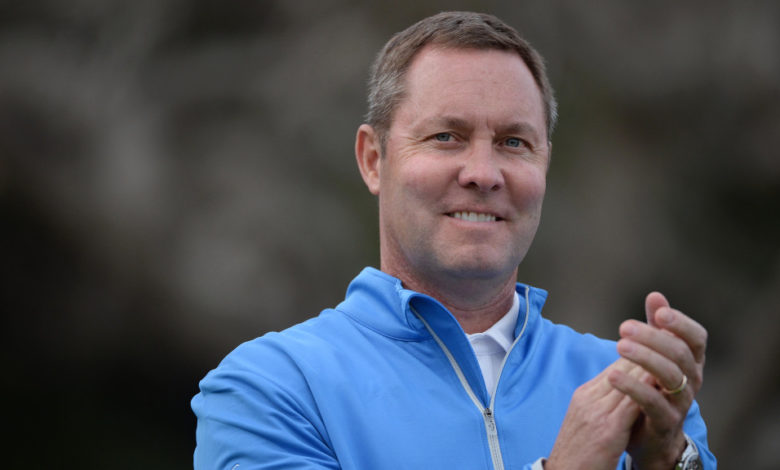
Mike Whan as the USGA’s next CEO? To hear Whan tell it, the odds, as he saw them, were “overwhelmingly” stacked against him. What seemed like such an obvious next step to so many for the outgoing LPGA commissioner wasn’t a slam-dunk to the man himself.
That is, until Whan made a few quiet phone calls to other leaders in the industry – Jay Monahan (PGA Tour), Keith Pelley (European Tour), David Abeles (TaylorMade) and the man he would replace at the USGA, Mike Davis.
“Their reaction was the game-over point for me,” said Whan. “Their reaction of ‘Please do this, this should be good for all of us. Let’s continue to do what we’re building together.’ It mattered to me that it mattered to them. Those are all the people that we’re going to have to pull together to make real change.”
One week ago, Whan signed on to join the USGA later this summer as CEO, becoming the eighth top executive in the organization’s history. The USGA’s announcement on Wednesday comes six weeks after Whan announced his decision to step down as LPGA commissioner after 11 years at the helm.
USGA President Stu Francis, who oversaw the CEO search process, said he’d wake up at 3 a.m. worrying about whether or not Whan would take the job. They’d interviewed a number of promising candidates, Francis said, but Whan was the shining light, the man who checked every box and could come in ready to move at 100 mph. (At this point during his video chat with Golfweek, Whan raised his Coke Zero bottle, a nod to the fuel behind his blistering pace.)
As one executive committee member put it on a recent call, “Shame on us if we don’t get this done,” Francis noted.
“The USGA has a unique role in golf in terms of we need to lead the way,” said Francis, “but we need to get people to come along with us.”
Particularly in the case of the ongoing distance debate, which as the USGA moves to the solution phase of its Distance Insights Report, there continues to be strong feelings on both sides of the aisle.
Rory McIlroy, a measured and respected voice in the game, recently called the report a “huge waste of time and money.”
Whan acknowledged that the distance problem won’t be solved in a team meeting in a board room at USGA headquarters. It will instead take an “industry huddle” to get to the finish line.
Much of Whan’s success at the LPGA – building the tour up from near ashes when he took on the job in 2010 and then passing the ultimate stress test by seeing the tour through a global pandemic – has been the strength of his partnerships. He knew what it was like to sit on the other side of a table as a check writer and used that experience to grow the tour from only 24 tournaments and official prize money of $41.4 million to the record $76.45 million and 34 official events that’s on the 2021 calendar.
As a former vice president of marketing at TaylorMade and vice president and general manager at the Wilson Sporting Goods Company, Whan brings instant credibility and can relate to equipment manufacturers and tour leaders from first-hand experience.
Whan said TaylorMade CEO Abeles was the first person to call and ask if he was thinking about the USGA job.
“I just got off the phone with a recruiter and I gave him your name,” Whan replied.
“I know that in this role I’ll spend a lot of time with David Abeles, or John Solheim or Bob Parsons or the whole team from Acushnet. All people that I would spend time with if I retired.”
The distance debate is a 100-year-old problem, Whan said, and he’s impressed that the USGA and R&A have committed to making changes that will be good for the game for the next 100 years.
“We understand that we have to protect the game enough to make sure we don’t obsolete ourselves,” said Whan, “but at the same time were not trying to stick R&D in a box.
“The people on the manufacturing side know me well enough to know I’m a marketing guy at heart. I love the innovation and we want to keep seeing innovation. We just have to make sure that the out of bounds stakes aren’t so far out that we wake up without the sport.”
The fast-talking Whan is quick to admit that there are plenty of areas within the USGA in which he is no expert. When asked about the rules, he said he’ll have a fast-forwarding system set up to send all rules questions directly to Thomas Pagel, senior managing director of governance. He wouldn’t dream of faking it but also requested to get signed up for the next virtual rules seminar so that “I won’t embarrass you probably more than I already will.”
LPGA players consistently praised Whan’s transparent approach. He often went off-script with reporters, apologizing to executives in the back of the room.
Whan, who has admitted that he might not be a great fit culturally for the USGA, will no doubt change the culture of the organization as it will inevitably change him. Hopefully there’s something powerful in the middle, he said.
Just as he recruited the rest of the industry to commit to growing girls golf on a larger scale, Whan sees the USGA’s role in capitalizing on the game’s recent participation boom as part of an industry-wide effort.
As Whan moves into a broader role in golf, his passion for the women’s game isn’t going anywhere. In fact, now that he oversees the biggest championship in women’s golf, the subject of equal purses at the U.S. and U.S. Women’s Open seems especially relevant.
Whan said it’s been on his list since 2010.
When asked last month what he’d miss the most about the LPGA, Whan said the front-row seat he had to watching young women achieve their biggest dream in real time – whether that was earning a tour card or winning a tournament.
“That’s going to be hanging on some plaque in my office,” he said, “so that every time I turn the lights off I remember to ask, am I doing enough to make sure that young girls all around the world, when I’m going to bed, are putting somewhere saying this one is for the U.S. Women’s Open.”

Mike Whan with an LPGA-USGA Girls Golf member (Getty Images/LPGA).
When asked if he had any ideas jotted down on cocktail napkins yet, a classic Whan-ism, he held up a legal pad with seven bullet points.
At the top of that list: invest in the best.
“The first thing we’re going to invest in is to make sure we’re the best championships in the world,” he said. “You don’t get there by historical relevance alone. You’ve got to invest in them.”
He’ll no doubt reveal the rest of that list in one of his many upcoming conference calls with his new staff. Francis said Whan will start full-time with the USGA in the middle of the year and that Davis will help with the transition.
As the governing body strives to connect with a growing and evolving golf culture, Whan’s dynamic personality and effective communication skills will be paramount to an organization that has had its fair share of PR struggles in recent years. There will be no shortage of bridge-building.
More than anything though, he’ll strive to be golf’s champion.
“I can promise you this, however long I’m head of the USGA,” he said, “there will be no louder promoter of the game, no matter what portion of the game we’re talking about. Of course I want to preserve the game, but only after I promote it.”
Source link








